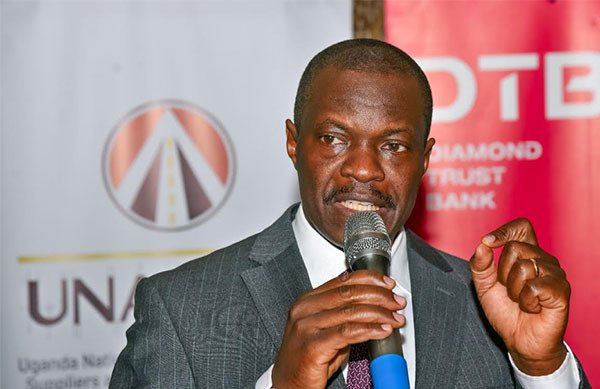
Kampala, Uganda | THE INDEPENDENT | Diamond Trust Bank (DTB) Chief Executive Officer, Geofrey Ssebaana, has urged players in Uganda’s construction sector to adopt stronger financial discipline, forge strategic partnerships, and integrate sustainability into their operations as key prerequisites for accessing financing from the country’s banking institutions.
He emphasized that improved financial management and forward-thinking practices are essential for building confidence among lenders and unlocking long-term capital needed to drive growth and resilience in the sector.
Speaking at the Construction procurement and finance dialogue organized by the Uganda National Association of Building and Civil Engineering Contractors (UNABSEC) recently, Ssebaana acknowledged the persistent financing challenges facing the construction sector.
He noted, however, that the banking industry is increasingly positioning itself to offer scalable and innovative financial solutions tailored to the unique needs of contractors. Ssebaana emphasized the importance of collaboration between banks and sector players to bridge financing gaps and unlock the full potential of Uganda’s infrastructure development
As a banker, I can confidently affirm that we are well-capitalized, willing, and fully prepared to support the construction sector,” Ssebaana stated, emphasizing that recent regulatory reforms such as capital enhancement, have significantly strengthened the lending capacity of financial institutions.
These reforms, he noted, have created a more robust and resilient banking environment, enabling banks to offer larger, more flexible, and more tailored financing solutions to meet the evolving needs of the construction industry.
Ssebaana urged contractors not to view themselves as second cousins to the banking sector, but rather as indispensable partners in shaping Uganda’s economic future. “You are not peripheral players, because in reality we see you as deeply valued collaborators in building the nation’s infrastructure and advancing its development agenda,” he stated.
Responding to growing public pressure for banks to offer low-interest or interest-free loans to contractors, Ssebaana acknowledged the concern but urged a more informed discussion. “It’s easy to call for interest rate caps like 5%, but we must consider the broader financial ecosystem. The pricing of credit is shaped by several factors, chief among them being the cost of liquidity, operational expenses, and regulatory requirements. These are tangible and unavoidable realities that influence how banks lend,” he explained.
Despite the challenges, Ssebaana pointed to a promising trend in the lending environment. “Loan interest rates are already trending downwards, where loan lending rates are already trending downwards, from over 20% to around 18%.
However, he cautioned that several recurring issues such as diversion of funds across unrelated projects, commonly known as “komingolingo”, continue to erode bank confidence in the sector.
The Minister of Works and Transport, Gen. Edward Katumba Wamala, called on commercial banks to re-establish trust with contractors, acknowledging that strained relationships, largely due to delayed government payments, have resulted in punitive loan terms for many local firms.
He stressed the urgent need for a more equitable financing framework, proposing the establishment of a dedicated construction financing window, similar to those available in the agricultural sector.
“It is unacceptable that our home-grown contractors are borrowing at rates as high as 20%, while their international counterparts access credit at just 4%. We must level the playing field,” he said.
On the regulatory front, the Minister urged the Public Procurement and Disposal of Public Assets Authority (PPDA) to revisit the criteria used to classify local contractors. He expressed concern over the misuse of shell companies that allow foreign firms to masquerade as local entities, thereby gaining an unfair advantage in public tenders.
Katumba also called for a more meaningful approach to local content enforcement. Referring to the current 30% local content requirement, he suggested a more tangible benchmark, whereby local contractors are entrusted with full execution of specific segments of infrastructure projects.
“For every 10 kilometers of road, at least 3 kilometers should be fully constructed by a local contractor—from sub-base to the final surface layer,” he proposed, underscoring the importance of giving Ugandan firms both opportunity and accountability.
UNABSEC President, Kiara Binta Nkuranga, welcomed the renewed collaboration between the government and the banking sector, describing it as a timely and strategic partnership. “Together, we will transform dialogue into action,” she declared, emphasizing that such cooperation is critical as the construction industry adapts to emerging institutional reforms and evolving economic demands.
Nkuranga noted that with the sector undergoing significant shifts, including regulatory changes, new funding models, and increased competition, strong alignment between contractors, policymakers, and financial institutions is more important than ever.
 The Independent Uganda: You get the Truth we Pay the Price
The Independent Uganda: You get the Truth we Pay the Price



